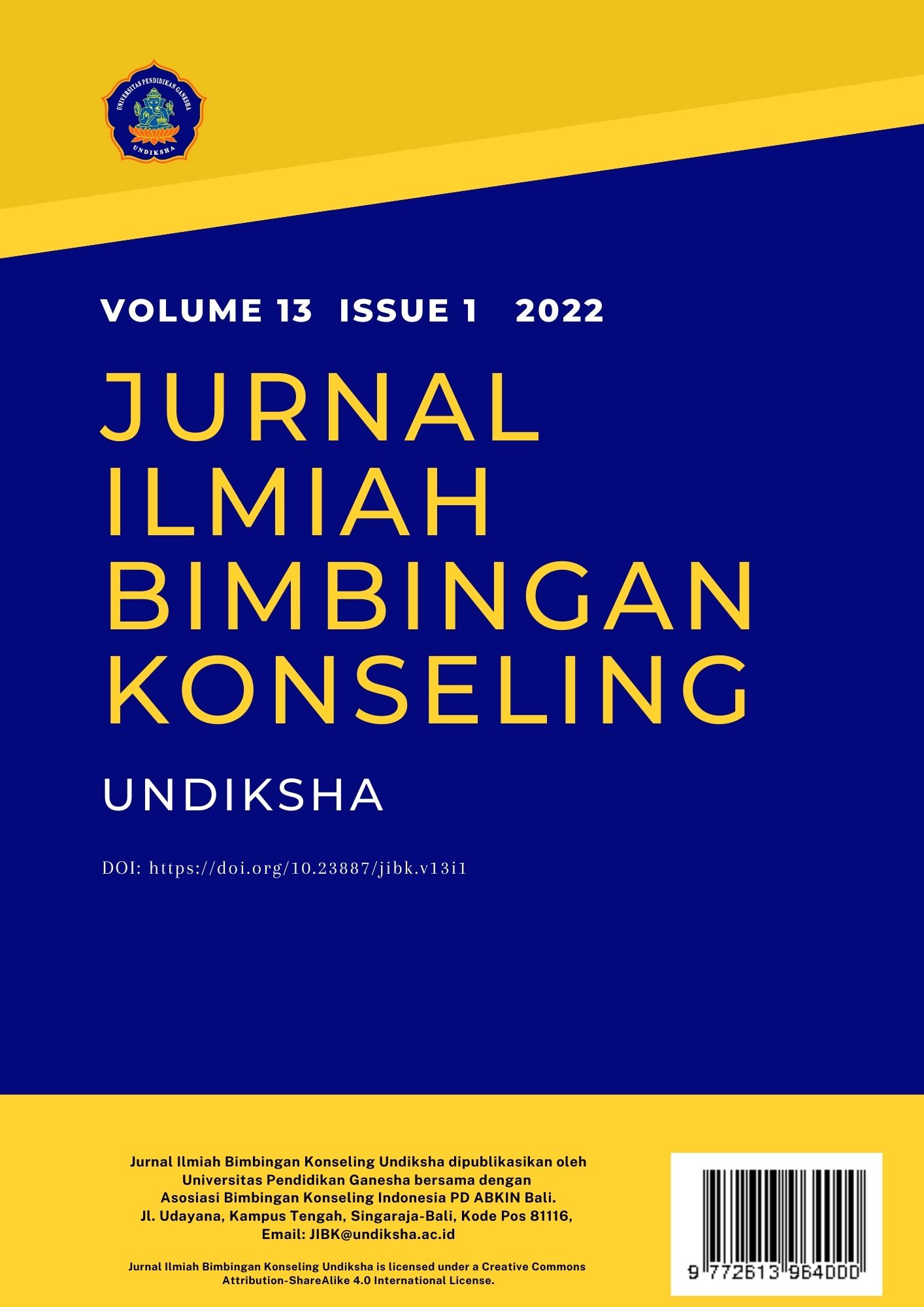Pola Asuh Otoriter dan Kecerdasan Emosi Remaja di Jayapura
DOI:
https://doi.org/10.23887/jibk.v13i1.42441Keywords:
Pola asuh otoriter, kecerdasan emosi, RemajaAbstract
This study aimed to analyse the correlation between authoritarian parenting and emotional intelligence (EI). The sample in this study were 160 students of SMA N 1 Jayapura, whose taken by simple random sampling technique. The instrument used in this research is the emotional intelligence scale by Goleman (2007) which consists of 41 items. The second, scale of authoritarian parenting by Baumrind (1971) consists of 23 items. The data were analysed by using Pearsons Product Moment Correlation. The results showed that there was a negative correlation between authotarian parenting and emotional intelligence r = - 0.200 with a significant level of 0.006 (p<0.05), which means that there is a significant negative relationship between authoritarian parenting anda emotional intelligence in adolescents.The findings showed that emotional intelligence is in the medium category and authoritarian parenting is in high category.
References
Artha, N. M., & Supriyadi. (2013). Hubungan antara kecerdasan emosi dan self efficacy dalam pemecahan masalah penyesuaian diri remaja awal. Jurnal Psikologi Udayana,1(1), 190-202. DOI: https://doi.org/10.24843/JPU.2013.v01.i01.p19
Azwar, S. (2012). Penyusunan skala psikologi (edisi kedua). Yogyakarta: Pustaka Pelajar.
Azwar, S. (2016). Metode penelitian. Yogyakarta: Pustaka Pelajar.
Baumrind, D. (1971). What research is teaching us about the diffeences betwen authoritative and authotarian child-rearing styles. In D.E. Hanachek (Ed), Human dynamics in psychology and education (3th ed). Boston: Allyn & Bacon.
Chandri, D. M., R, M. & Yuniarni, D. (2014). Pengaruh pola asuh orangtua terhadap kecerdasan emosi anak usia 5-6 tahun. Jurnal Pendidikan dan Pembelajaran Khatulistiwa 3(7).
Chao, R, K. (1995). Authotarianism: A cultural perpective on Asian American Parenting Practicies. New York. Reports.
Chao, R. K. (2001). Extending research on the consequences of parenting style for Chinese Americans and European Americans. Child Development, 72, 1832-1843. DOI: https://doi.org/10.1111/1467-8624.00381
Dewi, N. A., & Susilowati, L. P. (2016). Hubungan antara kecenderungan pola asuh otoriter (authoritarian parenting style) dengan gejala perilaku agresif pada remaja. Jurnal Psikologi Udayana, 3(1), 108-116. DOI: https://doi.org/10.24843/JPU.2016.v03.i01.p11
Domino, P. (2019). Pola asuh orangtua dengan menggunakan kekerasan terhadap anak dalam keluarga di Manggara, NTT. Prosiding Seminar Nasional & Call Paper.
Einstein, G., & Indrawati, E. S. (2016). Hubungan antara pola suh otoriter dengan perilaku menjalin persahabatan pada remaja di denpasar. Jurnal Psikologi Udayana, 4(1), 20-29. DOI: https://doi.org/10.24843/JPU.2017.v04.i01.p03
Fatmawaty, R. (2017). Memahami psikologi remaja. Jurnal Reforma, 6(2), 55-65. DOI: https://doi.org/10.30736/rfma.v6i2.33
Goleman, D. (2007). Kecerdasan emosional. Jakarta: gramedia Pustaka Utama.
Gunarsa, S. (2000). Psikologi praktis: Anak remaja & keluarga. Jakarta: PT. BPK Gunung Agung.
Hidayati, N.I. (2014). Pola asuh otoriter orangtua, kecerdasan emosi, kemandirian anak SD. Persona, jurnal Psikologi Indonesia, 3(1), 1-8. DOI: https://doi.org/10.30996/persona.v3i01.364
Hurlock, E.B. (1978). Perkembangan anak jilid 1 (edisi keenam). Penerbit Erlangga.
Maarif, N. N. (2021). Pengaruh pola asuh orangtua terhadap kecerdasan emosi pada remaja madya. Jurnal Ilmiah Psikologi, 9(1), 17-25.
Makagingge, M., Karmila, M., & Chandra, A. (2019). Pengaruh pola asuh orangtua terhadap perilaku sosial anak. Yaa Bunayya, Jurnal Pendidikan Anak Usia Dini, 3 (2), 116-122.
Novianty, A. (2016). Pengaruh pola asuh otoriter terhadap kecerdasan emosi pada remaja madya. Jurnal Ilmiah Psikologi, 9(1), 17-25.
Nurlaily, T. H., Maslihah, S., & Anastasia, W. (2020). Pengaruh pola asuh otoriter terhadap kecenderungan cyberbullying yang dimediasi oleh kecerdasan emosi pada remaja di kota Bandung. Inquiry Jurnal Ilmiah Psikologi,2 (1), 51-64. DOI: https://doi.org/10.51353/inquiry.v11i1.388
Rochaningsih, N. S. (2014). Dampak pergeseran peran dan fungsi keluarga pada perilaku menyimpang remaja. Jurnal Pembangunan Pendidikan:Fondasi dan Aplikasi, 2(1), 59-71. DOI: https://doi.org/10.21831/jppfa.v2i1.2618
Santrock, J. W. (2010). Life-span development. New York: Mc Graw-Hill.
Saputra, D. K., & Sawitri, D. R. (2015). Pola asuh otoriter orangtua dan agresivitas pada remaja pertengahan di SMK Hidayah Semarang. Jurnal Empati, 4(4), 320-326.
Sarwono, D. S. (2000). Psikologi remaja. Jakarta: PT Raja Grafindo Persada.
Sugiyono, P. D. (2017). Metode penelitian kuantitatif, kualitatif, dan kombinasi (mixed methods). Bandung: Penerbit Alfabeta.
Downloads
Published
Issue
Section
License
Copyright (c) 2022 Hana Jekrin Anisa Mano, Christiana Hari Soetjiningsih

This work is licensed under a Creative Commons Attribution 4.0 International License.
Jurnal Ilmiah Bimbingan Konseling Undiksha is an Open Access Journal. The authors who publish the manuscript in this journal agree to the following terms:
JIBK is licensed under a Creative Commons Attribution 4.0 International License. This permits anyone to copy, redistribute, remix, transmit and adapt the work provided the original work and source is appropriately cited.
This means:
Jurnal Ilmiah Bimbingan Konseling is licensed under a Creative Commons Attribution 4.0 International License.
(1) Under the CC-BY license, authors retain ownership of the copyright for their article, but authors grant others permission to use the content of publications in JIBK in whole or in part provided that the original work is properly cited. Users (redistributors) of JIBK are required to cite the original source, including the author's names, JIBK as the initial source of publication, year of publication, volume number, issue, and Digital Object Identifier (DOI); (2) The authors are the copyright owner of the article, and the author grants the JIBK held the first publication right.









.png)

.jpg)
